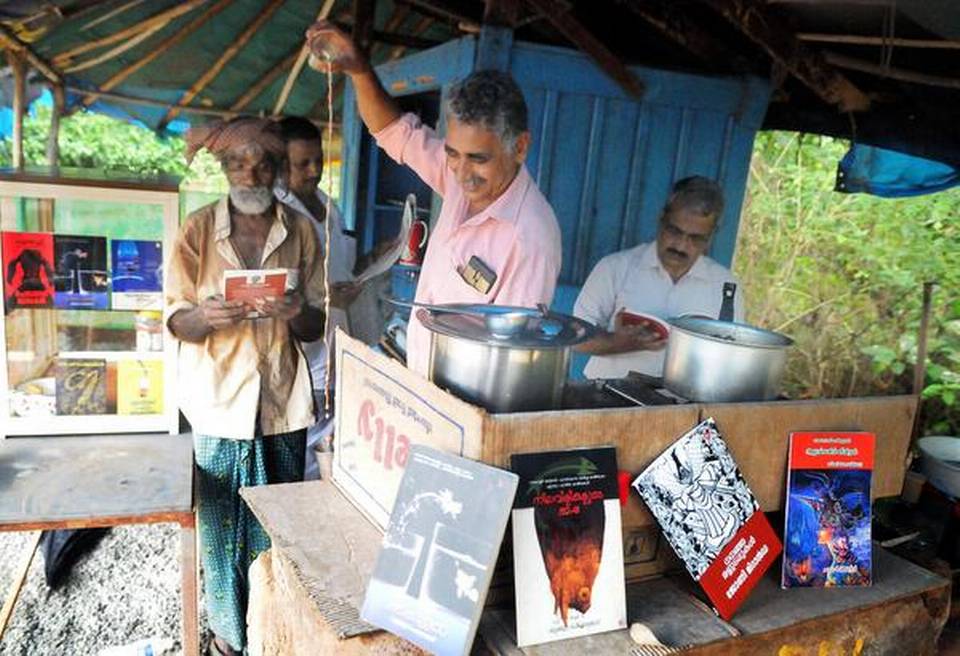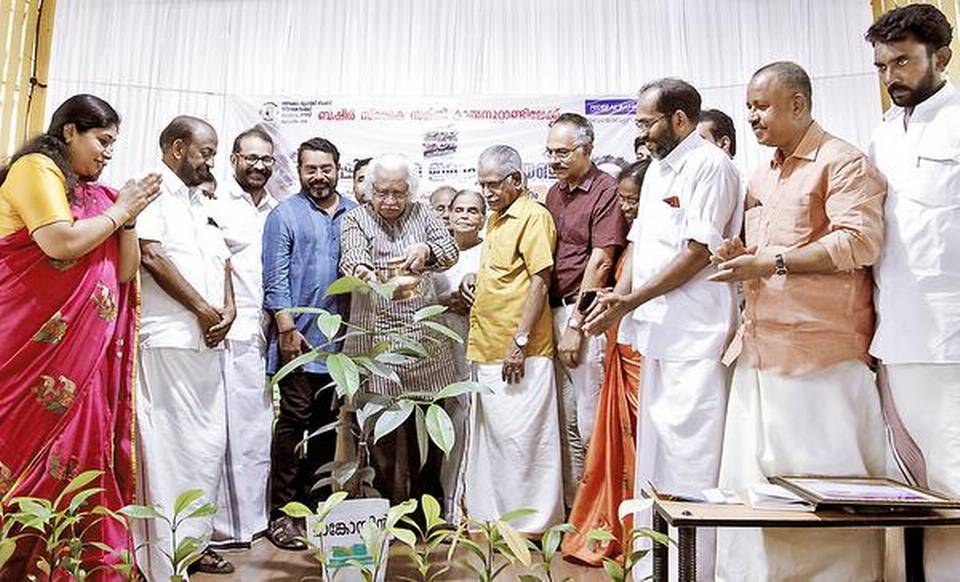Pedayangode Village , KERALA :

Welcome to Veranda, a teashop in a Kerala village, where ideas flow as liberally as the tea, run by school dropout-turned-littérateur Shukoor Pedayangode
At first glance, the roadside tea shack with a blue poly tarp stretched on wooden poles seems nondescript. Shukoor Pedayangode, its 50-something owner, looks equally unassuming as he tosses the sweet milk tea back and forth from saucepan to glass before serving it to his customers. But don’t be fooled: both this chayappeedika (teashop) in Pedayangode village, about 35 km from Kannur, and the tea-seller are as special as it gets. Over the years, this teashop called Veranda has become a literary hub, with celebrity authors not just from Kerala but also from neighbouring Karnataka and Tamil Nadu gracing it with their presence.
When I meet Pedayangode, it is late August and he has just reopened Veranda after a longish break when his shop was submerged under the waters of River Bavali when it breached its banks earlier in the month. But Pedayangode’s spirit hasn’t been dampened: he is all cheer as he talks about the next literary gathering at his teashop, scheduled for September 29. The special guest at the event? Tamil author Perumal Murugan — copies of the Malayalam translation of Murugan’s Poonachi are displayed at the teashop.
Free for all
The school dropout Pedayangode began to organise informal monthly literary gatherings at his teashop some four years ago. And he has so far hosted 34 discussions. Among the Malayalam writers and poets who have visited are Paul Zacharia, M. Mukundan, Khadeeja Mumtaz, P.F. Mathews, Kalpetta Narayanan, Rafeeq Ahmed and N. Prabhakaran, a veritable who’s who. Kannada writer Vivek Shanbhag and Tamil writer B. Jeyamohan have also been there.
“I announce every event in advance on my Facebook page,” says Pedayangode. The events generally last three hours and the audience is free to express views on the book under discussion and interact with the author. For non-Malayalam writers, Pedayangode gets friends who speak the language to act as moderators.
A bookworm from childhood, Pedayangode used to devour anything he found in print. “I read Vaikom Muhammad Basheer’s Mucheettukalikkarante Makal (Card Sharper’s Daughter) when I was in Class V,” he says. He hated Maths, and after Class V, he started skipping classes since he dreaded his teacher’s wrath. Eventually, he stopped school altogether.
One of 12 siblings, Pedayangode started odd jobs to help the family along. He worked in quarries, sold fish. “I earned some money selling fish; that’s when I started buying books both to read and to sell,” says Pedayangode.
In fact, even as a teenager he used to write poems for richer friends who would buy him books in exchange. His published poetry collections are quite a few: Onpathu Pennungal (Nine Women), Nilavilikalude Bhasha (Language of Screams), Mazhappollal (Rain Burn) Azhangalile Jeevitham (Life in the Depths).
Novel idea
He even wrote a novel called Veranda, which would later become the name of his teashop. It’s apt, given the idea of open space it connotes. Pedayangode envisaged his shop as a free space for discussions. “I wanted to encourage the reading habit and create an ambience for healthy discussions devoid of restrictions or posturing,” he says.
The monthly gatherings are open to all. “Around 30 to 50 people usually attend,” says Ashraf Macheri, Pedayangode’s neighbour and close friend. Macheri, who used to run a printing press before moving to the Gulf, recalls how Pedayangode would visit his press to collect waste paper to write poems on.
Publishing houses give copies of their books for sale at the teashop; books of the author under discussion are sold on the day. Pedayangode funds the literary meets from the commissions he gets from book sales.
He also organises book fests in Kannur schools to promote reading among students. Pedayangode misses no literary event in the area. These days, he is regularly invited to local colleges to inaugurate literary events. And he does all this while reworking a novel he had finished and left unpublished four years ago.
mohamed.nazeer@thehindu.co.in
source: http://www.thehindu.com / The Hindu / Home> Books> Tea Time / by Mohamed Nazeer / September 07th, 2019










